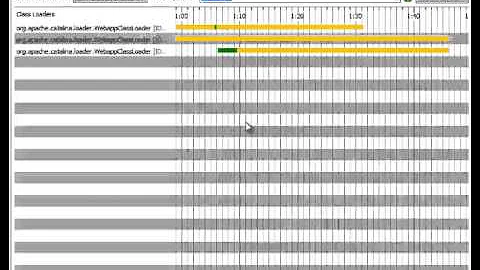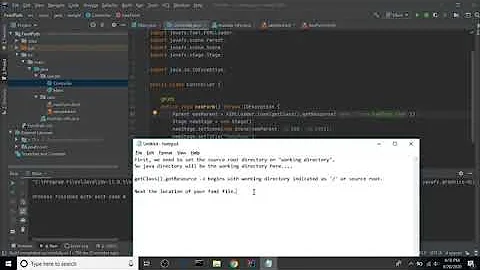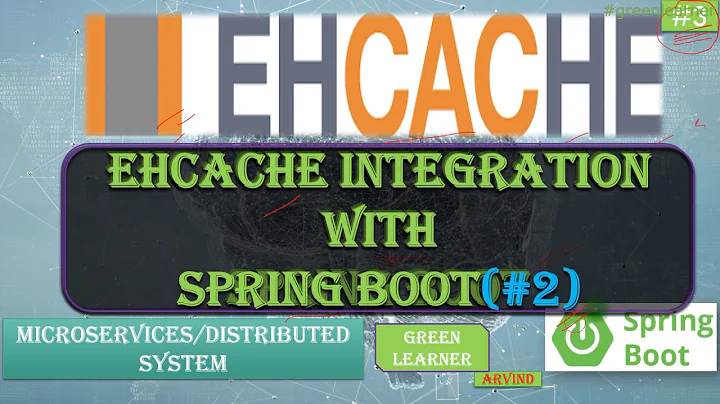What is the difference between Class.getResource() and ClassLoader.getResource()?
Solution 1
To answer the question whether there is any caching going on.
I investigated this point further by running a stand-alone Java application that continuously loaded a file from disk using the getResourceAsStream ClassLoader method. I was able to edit the file, and the changes were reflected immediately, i.e., the file was reloaded from disk without caching.
However: I'm working on a project with several maven modules and web projects that have dependencies on each other. I'm using IntelliJ as my IDE to compile and run the web projects.
I noticed that the above seemed to no longer hold true, the reason being that the file that I was being loaded is now baked into a jar and deployed to the depending web project. I only noticed this after trying to change the file in my target folder, to no avail. This made it seem as though there was caching going on.
Solution 2
Class.getResource can take a "relative" resource name, which is treated relative to the class's package. Alternatively you can specify an "absolute" resource name by using a leading slash. Classloader resource paths are always deemed to be absolute.
So the following are basically equivalent:
foo.bar.Baz.class.getResource("xyz.txt");
foo.bar.Baz.class.getClassLoader().getResource("foo/bar/xyz.txt");
And so are these (but they're different from the above):
foo.bar.Baz.class.getResource("/data/xyz.txt");
foo.bar.Baz.class.getClassLoader().getResource("data/xyz.txt");
Solution 3
The first call searches relative to the .class file while the latter searches relative to the classpath root.
To debug issues like that, I print the URL:
System.out.println( getClass().getResource(getClass().getSimpleName() + ".class") );
Solution 4
Had to look it up in the specs:
Class's getResource() - documentation states the difference:
This method delegates the call to its class loader, after making these changes to the resource name: if the resource name starts with "/", it is unchanged; otherwise, the package name is prepended to the resource name after converting "." to "/". If this object was loaded by the bootstrap loader, the call is delegated to ClassLoader.getSystemResource.
Solution 5
All these answers around here, as well as the answers in this question, suggest that loading absolute URLs, like "/foo/bar.properties" treated the same by class.getResourceAsStream(String) and class.getClassLoader().getResourceAsStream(String). This is NOT the case, at least not in my Tomcat configuration/version (currently 7.0.40).
MyClass.class.getResourceAsStream("/foo/bar.properties"); // works!
MyClass.class.getClassLoader().getResourceAsStream("/foo/bar.properties"); // does NOT work!
Sorry, I have absolutely no satisfying explanation, but I guess that tomcat does dirty tricks and his black magic with the classloaders and cause the difference. I always used class.getResourceAsStream(String) in the past and haven't had any problems.
PS: I also posted this over here
Related videos on Youtube
oligofren
A decent programmer - not exceptional; creating testable, readable code, like any seasoned programmer. Where I do stand out is that I strive to understand what the hell I am doing at every level. I try to avoid using code I cannot explain. That helps me in not getting stuck, and I like to use that knowledge when helping people; whether in forums, in my projects at GitHub or answering stuff on Stack Overflow. My forte is usually relating to questions on core javascript, shell scripting, and good unit testing practices (I have read my share of Michael Feathers). Co-maintainer of Sinon since 2015. Master of Science and Teaching (NTNU, UiO and TU Wien). #dev-ops #front-end #back-end #fp #jvm #javascript #python #scheme #sinon #tdd #kotlin
Updated on April 04, 2021Comments
-
oligofren about 3 years
I wonder what the difference is between
Class.getResource()andClassLoader.getResource()?edit: I especially want to know if any caching is involved on file/directory level. As in "are directory listings cached in the Class version?"
AFAIK the following should essentially do the same, but they are not:
getClass().getResource() getClass().getClassLoader().getResource()I discovered this when fiddling with some report generation code that creates a new file in
WEB-INF/classes/from an existing file in that directory. When using the method from Class, I could find files that were there at deployment usinggetClass().getResource(), but when trying to fetch the newly created file, I recieved a null object. Browsing the directory clearly shows that the new file is there. The filenames were prepended with a forward slash as in "/myFile.txt".The
ClassLoaderversion ofgetResource()on the other hand did find the generated file. From this experience it seems that there is some kind of caching of the directory listing going on. Am I right, and if so, where is this documented?From the API docs on
Class.getResource()Finds a resource with a given name. The rules for searching resources associated with a given class are implemented by the defining class loader of the class. This method delegates to this object's class loader. If this object was loaded by the bootstrap class loader, the method delegates to ClassLoader.getSystemResource(java.lang.String).
To me, this reads "Class.getResource is really calling its own classloader's getResource()". Which would be the same as doing
getClass().getClassLoader().getResource(). But it is obviously not. Could someone please provide me with some illumination into this matter? -
Jon Skeet almost 13 yearsI think "classloader root" would be more accurate than "classpath root" - just to be picky.
-
oligofren almost 13 yearsBoth can search "absolute paths" if the file name is prepended by "/"
-
oligofren almost 13 yearsNice answer with clear examples. Although the post actually was meant to get answers to two questions, I see now that the second questions is sort of hidden. Quite unsure of how/whether I should update the post to reflect this, but what I would like to know second is this (next comment):
-
oligofren almost 13 yearsIs there some kind of caching going on in the Class.getResource() version? What caused me to believe this is the generation of some jasper reports: We use getClass().getResource("/aDocument.jrxml") to fetch the jasper xml file. A binary jasper file is then produced in the same directory. getClass().getResource("/aDocument.jasper") is not able to find it, although it can clearly find documents at the same level (the input file). This is where ClassLoader.getResource() proved helpful, as it seems it does not use caching of the directory listing. But I cannot find documentation on this.
-
Jon Skeet almost 13 years@oligofren: Hmm... I wouldn't expect Class.getResource() to do any caching there...
-
oligofren almost 13 yearsDo you have any info on whether it caches the directory listing as well? This was the main difference between the two methods when when first looking up an input file, and then creating a file using that in the same directory. The Class version did not find it, the ClassLoader version did (both using "/file.txt").
-
 Pierre Henry about 11 yearsInteresting... I am hitting a case where getClass().getResource("/someAbsPath") returns a URL in the type /path/to/mylib.jar!/someAbsPath and getClass().getClassLoafer().getResource("/someAbsPath") return null... So "root of classloader" seems not to be a very well defined notion...
Pierre Henry about 11 yearsInteresting... I am hitting a case where getClass().getResource("/someAbsPath") returns a URL in the type /path/to/mylib.jar!/someAbsPath and getClass().getClassLoafer().getResource("/someAbsPath") return null... So "root of classloader" seems not to be a very well defined notion... -
 Pierre Henry about 11 years
Pierre Henry about 11 years -
Aaron Digulla about 11 years@PierreHenry:
getClassLoader().getResource("/...")always returnsnull- the classloader doesn't remove the leading/from the path, so the lookup always fails. OnlygetClass().getResource()handles a starting/as an absolute path relative to the classpath. -
oligofren over 10 yearsI too used Maven and IntelliJ, so this is the answer witn an environment that most closely matches mine and has a reasonable explanation for question #2.
-
LordOfThePigs almost 10 yearsThis behaviour appears to be a bug in Tomcat that was fixed in version 8. I added a paragraph about that in my answer about this question
-
Ilya Serbis over 6 yearsWhat about Class.getResourceAsStream()?
-
Asif Mushtaq about 6 years@JonSkeet why
this.getClass().getClassLoader().getResource("/");returning null? It should not be same asthis.getClass().getClassLoader().getResource("."); -
Jon Skeet about 6 years@UnKnown: I think you should probably ask a new question about that.
-
user207421 almost 6 yearsResources are not files. They might not be unpacked from the JAR or WAR file, and if not a
FileReaderorFileInputStreamcannot be used to access them. Answer is not correct. -
 Gaurav almost 5 years@JonSkeet the one with leading slash works flawlessly to fetch resources from test resources root!
Gaurav almost 5 years@JonSkeet the one with leading slash works flawlessly to fetch resources from test resources root! -
oligofren over 3 yearsThis is really not relevant to the discussion about classloaders. No one cares how to load a file here, but what makes the difference.
-
 jaco0646 about 3 years
jaco0646 about 3 years







